Effective professional development helps employees put their career plans into action while ensuring they remain aligned with the company’s strategic vision. Setting developmental goals which motivate employees to excel and develop their talent stack is a crucial aspect of great performance management. Read on to discover the career development questions you can use to get the most out of development conversations.
Ask the right career development questions
Asking the right career development questions helps encourage employees to take charge of their professional development. It allows them to advance their knowledge, resulting in a more productive and valuable member of staff.
Choosing the right development questions also makes it clear that your company is there to help them on their journey by providing the training and resources to develop the skills they need to succeed. Linking their professional development with their personal development can further enhance their performance capabilities and motivate them to develop new skills.
In this guide, we’ll explore:
- How to set developmental goals
- Connecting individual goals with the company’s overall strategy
- Understanding the difference between long and short-term goals
- Motivating employees to succeed
- Tips for employees meeting with a leader to discuss their professional development
Set developmental goals
Setting developmental goals for employees has been proven to drive better performance and increase motivation and engagement. Research from Gallup discovered a significant increase in engagement when developmental goals were adopted:
“Workplaces that will win in the near and long term don’t cut corners. Winning workplaces reimagine traditional team leaders as performance coaches. They require those coaches to account for their own strengths, their employees’ and the collective strengths of their teams. And these workplaces demand coaches lead by focusing on the basic, individual, teamwork and growth needs of an engaged workplace.”
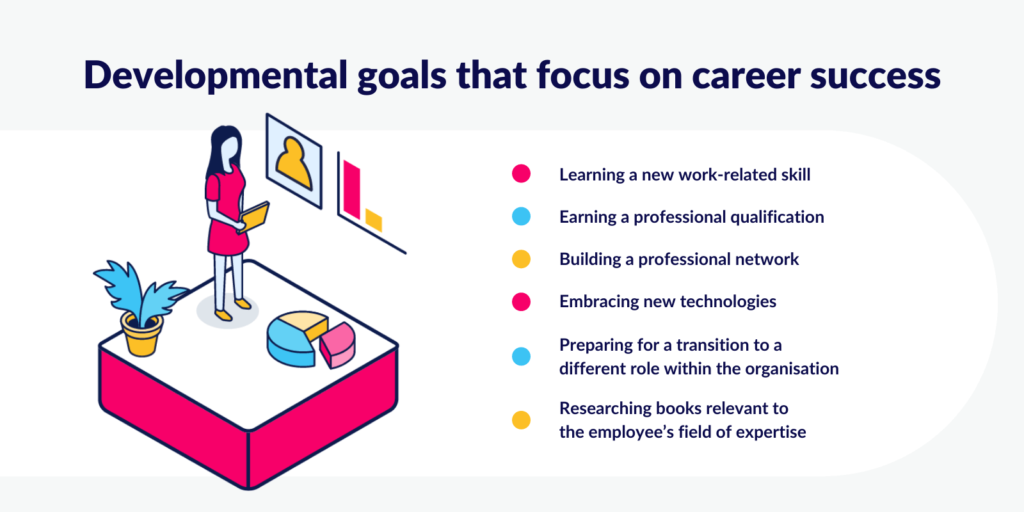
Some developmental goals which are designed to encourage employees to focus on career success include:
- Learning a new work-related skill
- Researching books relevant to the employee’s field of expertise
- Earning a professional qualification
- Preparing for a transition to a different role within the organisation
- Building a professional network
- Embracing new technologies
How can you connect career development questions to the organisation’s goals?
Employees that understand the company mission give your business a competitive advantage. If your workforce has a clear insight into how their work positively impacts the overall strategic vision, you’ll encourage employee engagement and retention.
By breaking down your organisation’s goals into their core components, individual goals can be directly linked to the work which needs to be performed to achieve them.
These can be expressed as team or departmental goals, with each team member given tasks related to their accomplishment, as well as individual goals which align with the bigger picture.
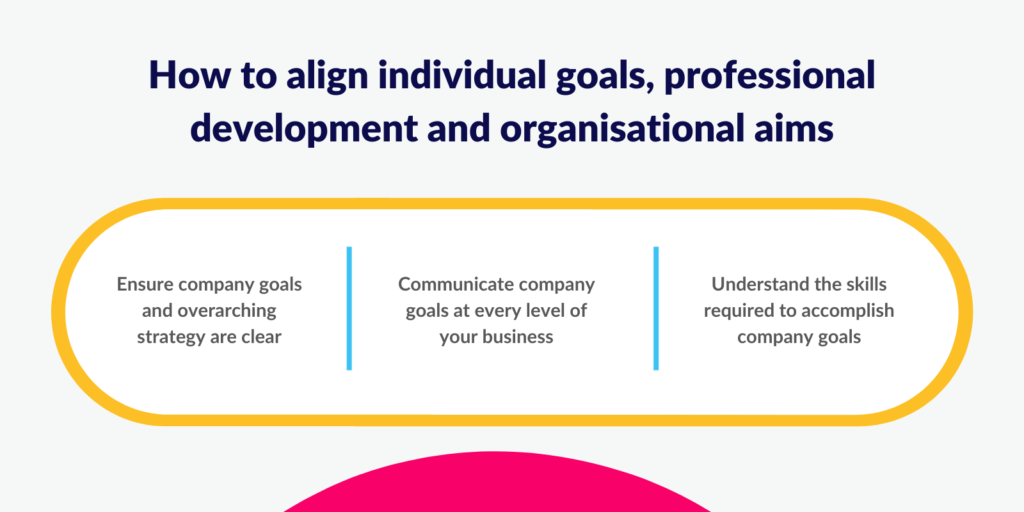
Methods that can help to align individual goals, professional development, and organisational goals include:
- Ensure company goals and overarching strategy are clear. If your employees don’t have a solid understanding of the direction the company’s leaders want to take the business, they don’t know what they’re working towards.
- Communicate company goals at every level of your business. Alignment only occurs when it is consistently applied at all levels of the company hierarchy. Use your company’s news feeds and other digital communication methods to make sure the strategy is understood by junior employees, all the way up to senior executives.
- Understand the skills required to accomplish company goals. By using departmental and organisational charts to determine where skills reside, the professional development of each team member can be fine-tuned to fill any skills gaps, aligning their development with the requirements of the company.
What are your short-term and long-term goals?
Asking employees about their short-term and long-term career goals helps them to prioritise how they approach their professional development. Most employees will be faced with a broad range of potential career goals, so discussing this regularly allows them to hone in on realistic goals that are achievable within their existing talent stack.
You can also consider pairing SMART and Stretch goals for optimal performance, adapting the framework for short-term goals to help employees work towards ambitious targets. Professional development takes time and requires patience, so structuring these goals in a way that helps to break them down into achievable milestones gives employees a better sense of progression as they work towards them.
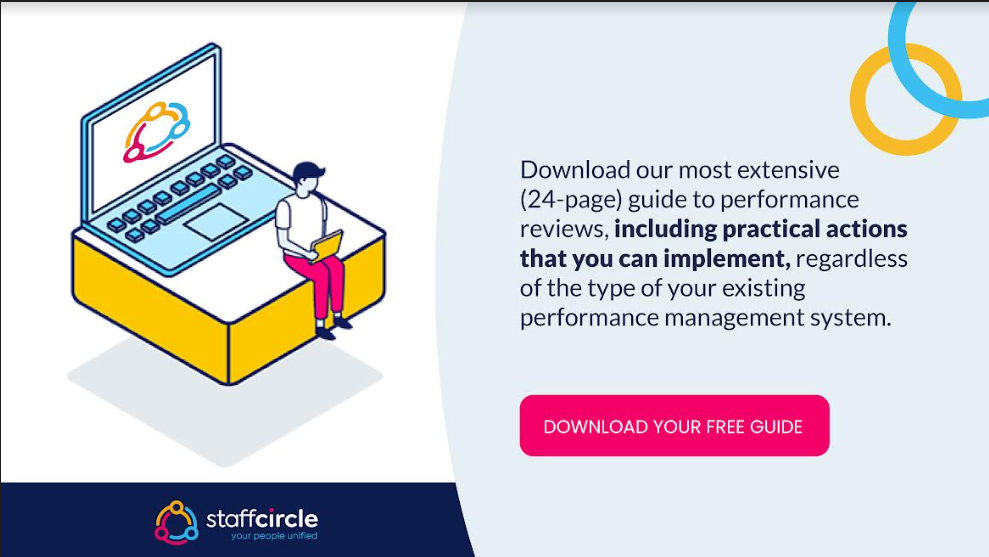
Use goal-setting software to assist with development objectives
Managing and prioritising goal-related work can be achieved by using OKR objectives software, allowing users to monitor their progress in real-time.
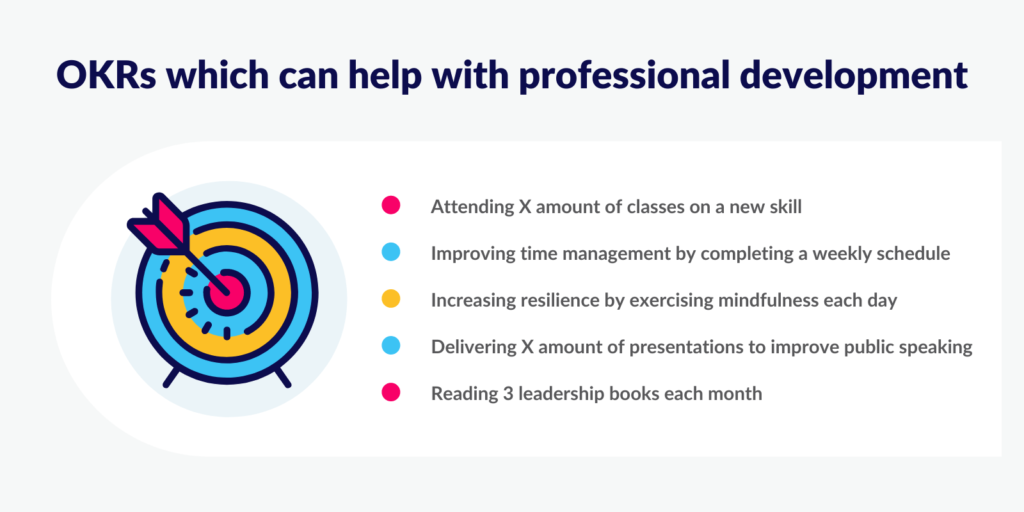
Examples of OKRs which can help with professional development include:
- Attending X amount of classes on a new skill
- Improving time management by completing a weekly schedule
- Increasing resilience by exercising mindfulness each day
- Delivering X amount of presentations to improve public speaking
- Reading 3 leadership books each month
What motivates you?
Understanding what motivates employees requires ongoing conversations to understand what it is they want most from their career.
Every employee approaches development in their own unique way. While one employee might prefer to brush up on a new skill by investing in detailed books on the topic, another may prefer a hands-on approach that requires working with a mentor.
By sitting down with their employees to figure out the learning methods best suited to their personalities, managers and team leaders can strategise the optimal plan to encourage employees to develop their career paths.
How do you plan to continue your professional growth?
The importance of encouraging employees to pursue their professional growth cannot be understated. The article from Deloitte, Elevating the Workforce Experience: The Growth Relationship, sums up the benefits of a workforce experience which places an emphasis on professional growth:
“Professional growth is an essential part of the workforce experience. It allows workers to develop new skills as well as new connections, and it helps bring new meaning to people’s working lives, in addition to bringing new meaning to work. By demonstrating a commitment to employee growth, organizations can better align their missions and goals with those of their employees—this improves outcomes for workers, customers, and the business alike.”
Setting up a Personal Development Plan (PDP)
A Personal Development Plan can be used to give employees a clear outline for their professional development, including any training objectives and milestones. By aligning career and personal goals, a PDP can help employees build on their strengths while working to address weaknesses.
The plan can incorporate multiple goals that help deliver career success while also keeping them in line with your company’s strategic vision.
Tips for meeting with a leader
Employees with upcoming meetings to discuss their career development with their manager can take several steps to make the most out of the meeting. To get the most value from these conversations, both for employees and for the company, outline the best practice ahead of time.
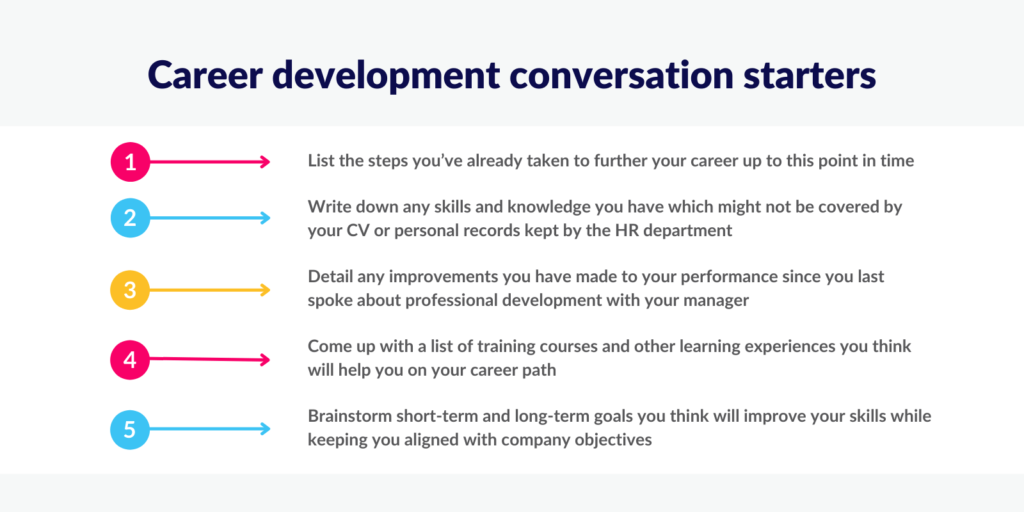
For example, send the below list of conversation starters to employees who are preparing for a career development discussion:
- List the steps you’ve already taken to further your career up to this point in time
- Write down any skills and knowledge you have which might not be covered by your CV or personal records kept by the HR department
- Detail any improvements you have made to your performance since you last spoke about professional development with your manager
- Come up with a list of training courses and other learning experiences you think will help you on your career path
- Brainstorm short-term and long-term goals you think will improve your skills while keeping you aligned with company objectives
In Summary
Conducting career development conversations with employees will help them to improve their skills through appropriate coaching and training opportunities.
This guide will help you to ask the right questions to understand what motivates your employees to succeed, and set goals that align their career aspirations with the strategic aims of the company.





